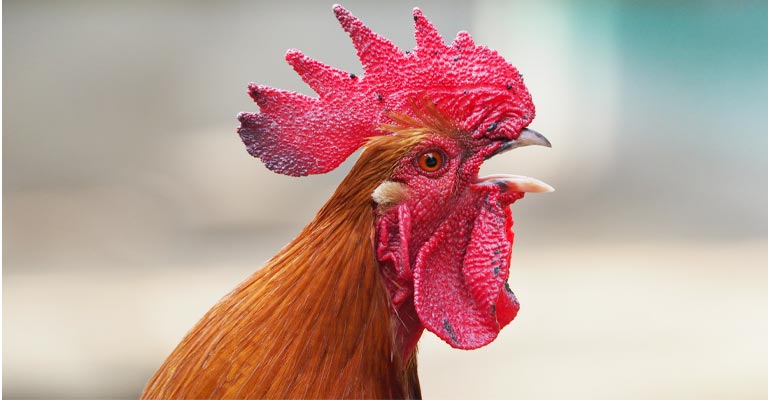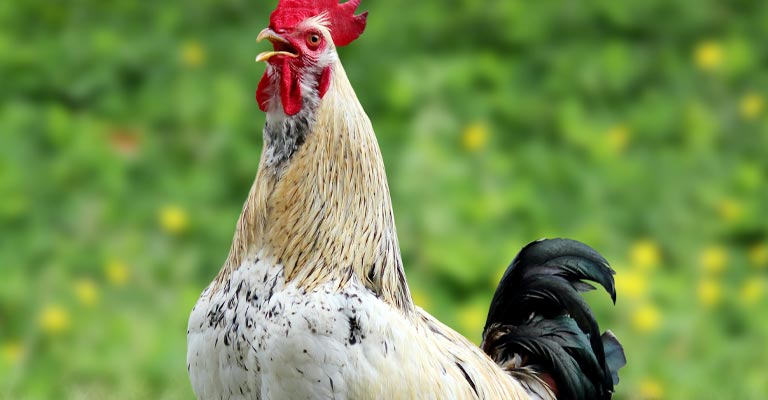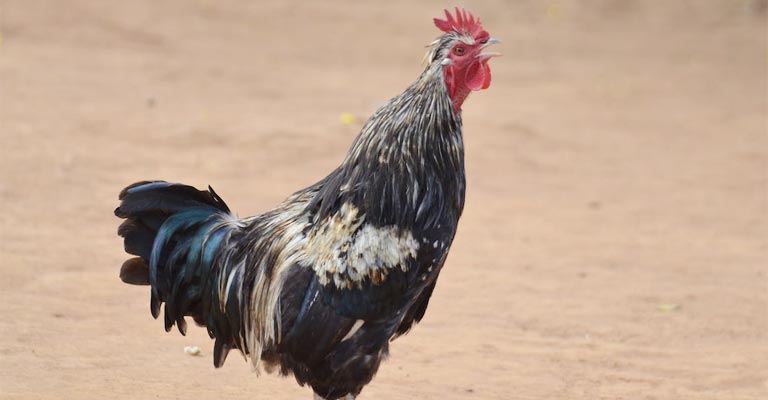Rooster’s crow! It’s their signature note and they want it to be heard by everybody in the region.
They crow one or two hours before dawn, sometimes even before that! So, if you have a rooster near where you live, there’s no need to set an additional alarm.
You will naturally have the rooster crowing, wake you up in the dawn. But if you want to sleep a little more and are totally annoyed by the calls, we are here for you.
How to stop rooster crowing? If that’s the answer you are looking for, the first thing you need to know is why a rooster crows and the nature of the call. Don’t worry! We have it all under control.
Our article will guide you today to the comprehensive pattern of a rooster’s crowing and how to prevent it. Let’s begin.

You Should Know,
- It’s a common misconception that roosters crow only in the morning. That’s not entirely true. They can crow throughout the day and even at night.
- Roosters come with different and unique roosters. Each rooster can understand different tones of crowing coming from another rooster, as stated by researchers.
- Crowing is not only a signal to wake up the farm. It can bear other significant meanings too, such as territory occupancy, communication with other roosters, or simply in triggered by external factors like light or noise.
- Contrary to popular belief, it is not the male roosters only. Hens can also crow too. However, they are less common and typically occur in hens with hormonal imbalances.
- Roosters adapt differently to their environment. Studies have shown that roosters in urban areas tend to crow less frequently and more quietly than their rural roosters.
So, by now you know, although most common in the morning, roosters also crow during different times of the day. Urban roosters often crowd less than rural ones due to urbanization! There’s simply no mood to do it!
How To Stop A Rooster Crowing?

To get better preventive measures, you must learn the reason behind crowing. Here are some of the primary reasons why roosters crow,
All birds including the roosters routinely follow the circadian rhythms. It’s a natural physio functionality in response to sunlight and darkness. Roosters follow this daily routine to start the day and wake up the flocks.
It is genuinely during the sunrise when this clock starts for the roosters. They crow early to let others know nearby that, the territory is occupied and he is there for the flock.
It’s a genuine territory call for other roosters. When a rooster crows, he is usually sending a warning to other roosters that, they shouldn’t trespass the same area or it would result in a fight.
Some roosters may crow a little bit earlier than other roosters. This triggers others in nearby farms and they also start to wake up, and ultimately the crowing cycle begins.
Why Do Roosters Crow at 3 AM?
Well, not often! Sometimes, you may hear a rooster crow at 3 AM. Even for an early-day starter that’s too early to crow. So, why is the rooster crowing at 3 AM?
Genuinely, roosters have this internal clock set up as we all know. But if it’s not regular, that means something’s been troubling them. An unusual crowing at 3 a.m. can have different meanings, such as
- He is sick and not feeling well.
- There’s a predator nearby (the most common reason).
- He is just having a mood swing.
Here are a few reasons, why a rooster may crow unusually and not at dawn. If that’s an unusual call in the middle of the night, you should go and check out whether they are fine or not.
How to Stop A Rooster Crowing?

Some people, especially the ones living by the village, often get used to the cock-a-doodle-doo of a happy rooster. However, if you can’t get used to the cheerful crowing and want to set up your own alarm clock, we have some advice for you.
It’s important to note that, it’s not entirely possible to stop a rooster from crowing. Come on! It’s their signature tone!
You can eventually adjust the lifestyle of a rooster and minimize the vocalizations! Here’s how you can do it.
1) How Many Roosters Do You Have?
One rooster is enough for 10 hens. If you have multiple roosters for the same flock, it’s wise to reduce competition. Roosters are principal by nature.
With multiple roosters in the same flock, they would follow the chain of hierarchy with the most senior rooster – the leader. He will lead the flock and crow first.
Other roosters will follow and crow in series – the second, the third, and it goes on. On average, a rooster can crow 12-15 times a day. So, the more roosters you have, the more sounds you get.
You can start by reducing the flock number, and consider giving away other roosters to nearby farms where there is none.
2) Look for Predators
A rooster, by born, will protect his flock. He will crow early to make sure of his dominance and aware of the nearby predators and competitors. Observe the daily routine first and learn what makes the rooster crow frequently.
It also depends on where you live and if the area inhabits predators like snakes, birds of prey, foxes, or coyotes. A rooster will try to protect the flock with continuous warry sounds.
Learn more about: How Much Can an Eagle Lift? And find out are the chickens on the list.
It will differ from regular crowing sounds too. Genuinely, roosters spread their neck and crow. But in times of danger, they will cluck continuously to warn his flocks.
So, before you go mad over the roosters’ sounds, are you sure that your intervention is not needed?
Look for possible predators. You can use a fence to prevent the intruders from getting in, or simply use traps for foxes or coyotes.
3) Meet Their Needs
Roosters also crow to communicate properly with other flock mates and sometimes, you too. Sometimes, they may also crow to draw your attention.
Such as, the flock may have run out of food, or water. In such a case, members of the flock will notify the rooster to alarm you.
When everything’s alright, and the roosters still crow, make sure to give a look at the food bowls. Fill the water and containers regularly before they run out.
It will keep the flocks happy which in turn will result in less crowing from the rooster too. You will have less noise to deal with!
Short Note,
Special callers are available to discourage the roosters from crowing. It is stuck to their neck and will prevent them from making loud noises.
However, some people may not advise this practice, as it can be often uncomfortable for the roosters. Ultimately, the choice is yours to make.
We are almost at the end of our article. Our three primary reasons will help you prevent the frequent crowing sound but may not completely prevent it. It’s their birthright 😀
Let us know in the comment section, how our article has helped you. Also, share our articles with others, it will help us grow.